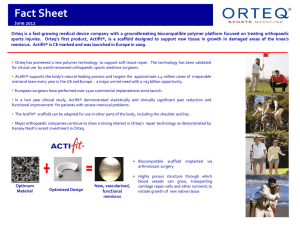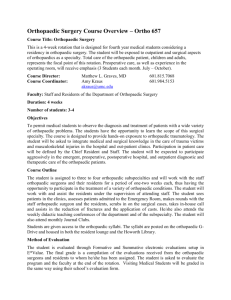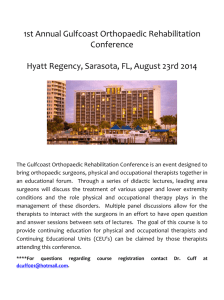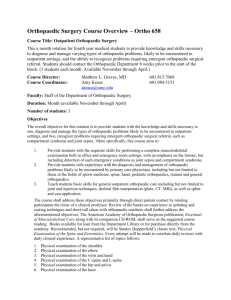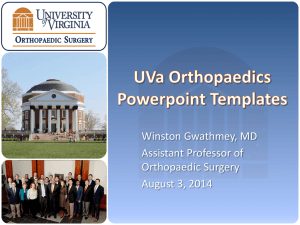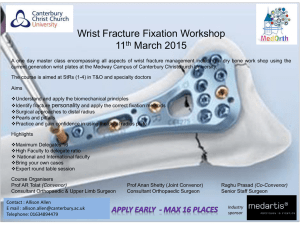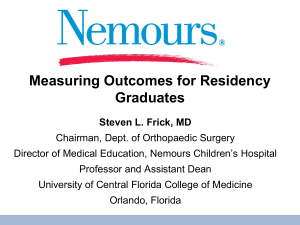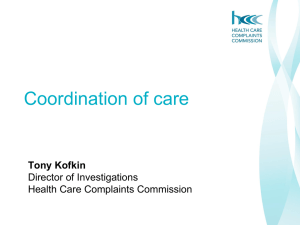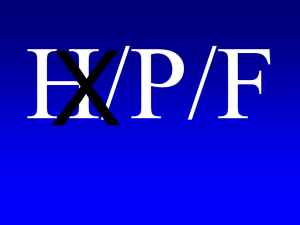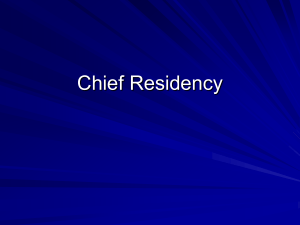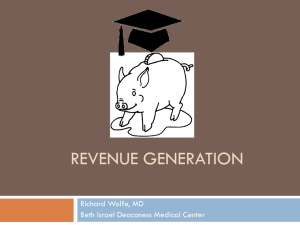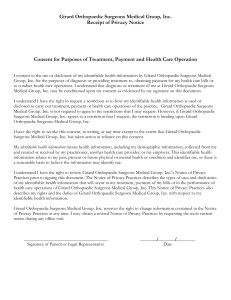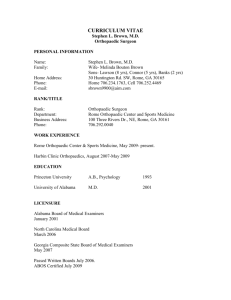Orthopaedic Physical Therapy Clinical Residency
advertisement
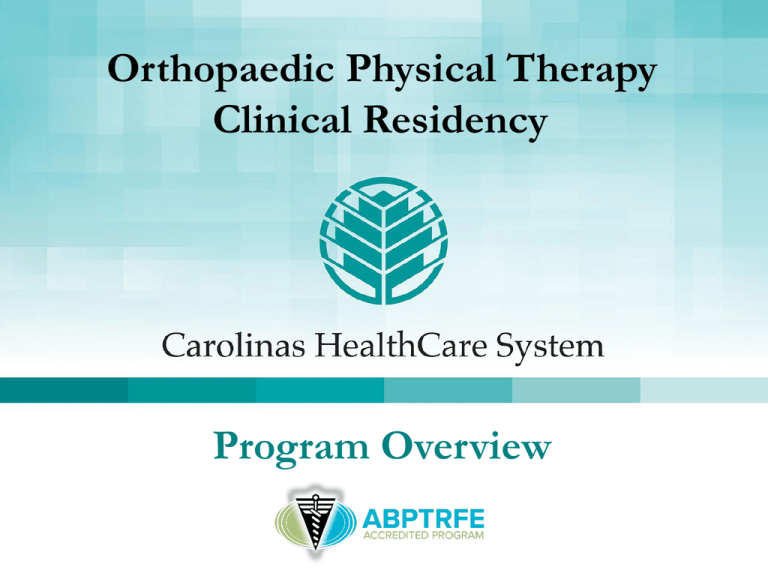
Orthopaedic Physical Therapy Clinical Residency Program Overview Clinical Residency Residency Program Mission Statement: To provide a post-professional clinical education experience that will facilitate and accelerate the attainment of advanced knowledge and skills in orthopaedic physical therapy. Clinical Residency Residency Program Goals: 1. 2. 3. Support the mission of Carolinas HealthCare System by providing an organized educational opportunity that facilitates and accelerates excellence in orthopaedic physical therapy Provide a curriculum consistent with the Description of Specialty Practice (DSP) in orthopaedic physical therapy practice so that residents will be prepared to sit for the ABPTS (OCS) certification exam Offer a program that prepares physical therapists to contribute to the body of knowledge in orthopaedic physical therapy by participating in a clinical research project Clinical Residency Residency Program Goals: 4. 5. 6. Offer a program that prepares physical therapists to better serve their organization and community as advanced direct access providers, clinical leaders, and consultants Offer a program designed to improve proficiency in the application of manual examination and treatment procedures, functional movement assessment, and therapeutic exercise prescription To be a nationally recognized provider for postprofessional clinical training within selected areas of physical therapy specialty practice Clinical Residency Residency Program Objectives: 1. 2. 3. 4. 5. The resident will practice advanced orthopaedic physical therapy clinical skills The resident will demonstrate the skills necessary to critically review the scientific literature pertinent to orthopaedic physical therapy The resident will participate in a clinical research project The resident will be prepared to be an autonomous provider of physical therapy services within their specialized area of clinical practice The resident will pursue ABPTS certification within their practice specialty upon program completion Faculty Background • 5 board-certified in orthopaedic physical therapy (OCS) • North American Institute of Orthopaedic Manual Therapy (NAIOMT)/Clinical Fellowship Instructor/Fellow, AAOMPT • University of St. Augustine manual therapy certification (MTC) • Andrews University DScPT program • Functional Movement SystemsTM (FMS & SFMA) • SportsmetricsTM certification (Cincinnati SportsMedicine) • Maitland-Australian and Rocabado approaches • Myopain Seminars (Trigger Point Dry Needling) • Institute of Physical Art • Graston Technique® (IASTM) Residency Faculty • Mike Agnone, PT, OCS, ATC • David Aiken, PT, DSc, OCS, COMT, ATC, FAAOMPT (Residency Program Director) • Susan Aiken, PT, OCS • Andrew Ball, PT, DPT, PhD, MBA, OCS, CMTPT, PES • Marco Caiazza, PT, MTC • William Freres, PT, CMTPT, PES • Gary Of, PT, DPT, OCS • Diane Wassum, PT Program Philosophy • The human body is an interconnected dynamic system with its function dependent on the interrelationship of the myofascial, articular, and neuromuscular systems • Pain related to the musculoskeletal system is most effectively managed when treatment is directed towards optimizing efficient functional movement • The primary role of the orthopaedic physical therapist is to identify impairments to efficient functional movement involving the articular, myofascial, and neuromuscular control systems and, through treatment and education, resolve these impairments • Integrating current best evidence with an eclectic philosophy and the ICF as the model for a patient centered care approach Residency Program Overview • 12 month duration (50 weeks) – January to December • 36 hours/week patient care (1728 hours) • 152 hours of 1:1 mentoring with faculty during patient care (4 hours/week x 38 weeks) • Mentoring with: board-certified orthopaedic PTs (OCS), TMJ specialist, certified manual/manipulative PTs/AAOMPT fellow, hand therapy specialists, certified myofascial trigger point therapists (CMTPT) • 4 hours/week of faculty instruction – didactic/lab (168 hours) • Curriculum includes Myopain Seminars trigger point dry needling (DN1) as optional instruction • Physician shadowing/interaction with an orthopedist, physiatrist (Physical Medicine & Rehabilitation), and radiologist (20+ hours) • Independent readings, projects, and assignments Curriculum Components 1. Research Methods & Evidence-Based Practice 2. Clinical Reasoning 3. Foundations of Orthopaedic Physical Therapy 4 Medical Management of the Orthopaedic & Musculoskeletal Patient 5. Principles of Differential Diagnosis & Medical Screening 6. Functional Orthopaedic Rehabilitation 7. Lower Quadrant – Regional Examination, Evaluation, and Management 8. Upper Quadrant – Regional Examination, Evaluation, and Management January February March April - July July - November Typical Resident Weekly Schedule SUNDAY MONDAY TUESDAY WEDNESDAY THURSDAY FRIDAY Patient care Lecture/Lab Patient care Mentoring Patient care LUNCH LUNCH LUNCH LUNCH LUNCH Patient care Patient care Patient care Patient care Patient care 7:30 AM 8:00 AM 9:00 AM 10:00 AM 11:00 AM 12 NOON 1:00 PM 2:00 PM 3:00 PM 4:00 PM 5:00 PM 6:00 PM SATURDAY Curriculum Resources • Orthopaedic Section Monograph Series & Resources: Current Concepts of Orthopaedic Physical Therapy, 3rd ed. Diagnostic Imaging in Physical Therapy Pharmacology Postoperative Management of Orthopaedic Surgeries Basic Statistics for Understanding the Physical Therapy Literature • Required Texts: Cook/Hegedus, Orthopedic Physical Examination Tests: An Evidence-Based Approach, 2nd ed. McEwen, Writing Case Reports: A How-to-Manual for Clinicians, 3rd ed. Curriculum Resources • Recommended Texts: Placzek/Boyce, Orthopaedic Physical Therapy Secrets, 2nd ed. Cook, Movement: Screening, Assessment, and Corrective Strategies Sueki/Brechter, Orthopedic Rehabilitation Clinical Advisor • For Trigger Point Dry Needling Instruction: Dommerholt/Fernandez-de-las-Penas, Trigger Point Dry Needling: An Evidenced and Clinical-Based Approach (required) Kostopoulos/Rizopoulos, The Manual of Trigger Point and Myofascial Therapy (recommended) Curriculum Resources • DVD/Videos: The Scan Exam (NAIOMT) Exercises for the Lumbar Patient (IPA) Key Functional Exercises You Should Know (Cook) Examination and treatment techniques • Current Research: Research articles relevant to topics of instruction Required and optional readings Article selections will vary with new research developments Resident Evaluation • Weekly Feedback Forms: Clinical Supervision form Clinical Instructor Prep form • Clinical Skills Performance: APTA Self-Assessment Tool APTA Clinical Skills Performance Evaluation Tools for PTs – Orthopedics • Performance of Examination & Treatment Procedures: Carolinas Rehabilitation Residency Procedures Performance Assessment Tool 4 Live Patient Examinations – Lumbopelvic, Lower Extremity, Cervicothoracic, Upper Extremity Resident Evaluation • Written Examinations: Foundations of Orthopaedic Physical Therapy Principles of Differential Diagnosis & Medical Screening Orthopaedic Section monograph examinations Basic Statistics for Understanding the Physical Therapy Literature • Assignments and Projects: Professional Portfolio Case Study and Research Study critiques Clinical Reasoning assignments Physician Observation Reflective paper Post-Operative Protocol assignment Final Residency Project (case study) and Presentation
